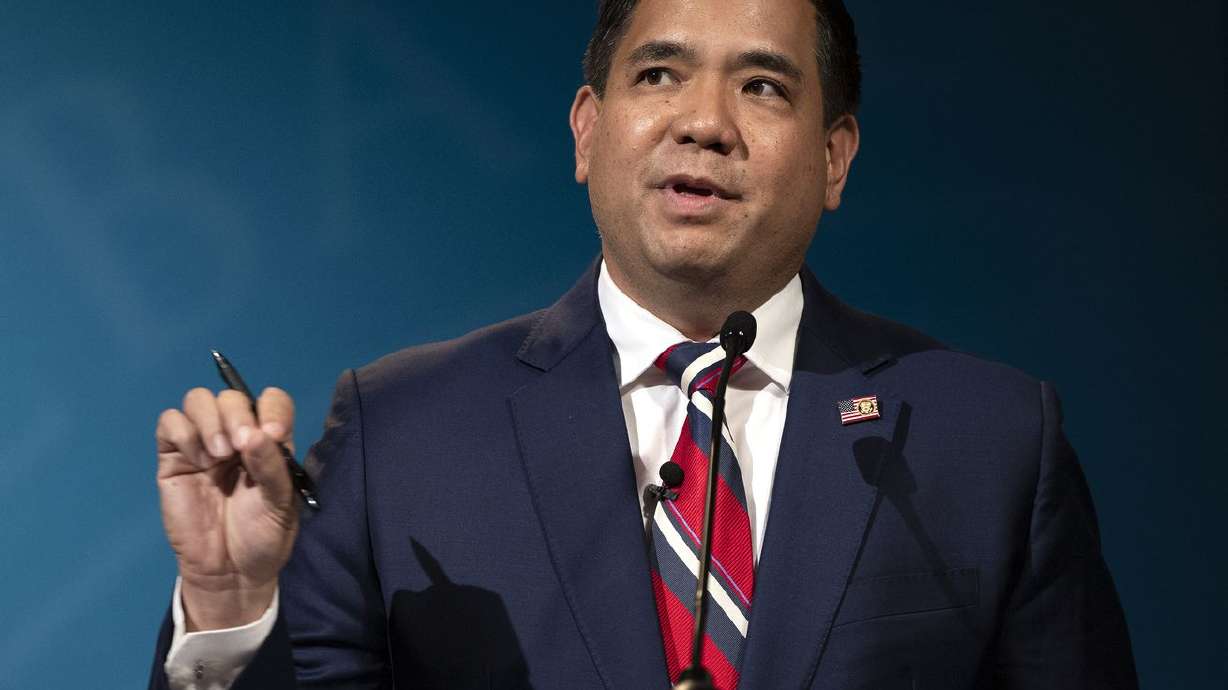Estimated read time: 5-6 minutes
This archived news story is available only for your personal, non-commercial use. Information in the story may be outdated or superseded by additional information. Reading or replaying the story in its archived form does not constitute a republication of the story.
SALT LAKE CITY — Utah Attorney General Sean Reyes announced Wednesday his office will co-lead a new lawsuit targeting Google and its alleged anticompetitive practices in how the company runs its Play Store, the No. 1 app distributor for phones that operate on another Google product, the Android operating system.
The action marks the third multi-state suit that includes Utah among plaintiffs attempting to take U.S. Big Tech companies to task for alleged abuses of market dominance. The other filings are against Facebook and another Google suit that is focused on the company's search functions. While a federal judge dismissed the complaint against Facebook last month, the case is still alive and could resume if an amended complaint is filed. Reyes wasn't able to cite the costs, so far, of the various lawsuits but said it was likely in the "hundreds of thousands" of dollars.
Reyes said Google is gouging consumers and small businesses by charging unfair commissions, in some cases up to 30%, on things like in-app purchases and upgrades for popular games.
"Google is using its hyper-dominant market position to unlawfully leverage billions of added dollars from small companies and consumers," Reyes said in a press briefing. "We believe these are monopolist actions that need to be addressed immediately."
Reyes said his office has heard numerous complaints from Utah consumers, Utah businesses and businesses outside the state about the impacts of Google's fees, which he said far exceed the more market-appropriate commission rates of 2%-3% charged by other, but smaller, app distributors. He also called out the company for manipulating the Android system to perform poorly when running programs sold outside the Play Store, also known as Google Play, compelling developers to play by Google's rules.
"Most consumers don't know that Google has imposed fees far beyond market rates," Reyes said. "We believe Google is using monopolistic leverage to force app developers into the Google Play Store environment."
Reyes said the lawsuit was filed in California's Northern District federal court and the co-leaders in the action include the attorneys general of New York, North Carolina and Tennessee. Reyes said 37 states, so far, are participating and he is expecting a trial in spring of 2022.
When asked if the complaint dismissal in the Facebook case would have a chilling effect on other Big Tech-focused legal actions his office is involved with, Reyes said his team has looked closely at the Facebook ruling and doesn't believe it impacts any of the current cases.
In early December of last year, Reyes' office announced it had joined dozens of states in a lawsuit alleging Facebook was illegally buying up companies that could pose future challenges to the company's dominant place in the world of social media.
Critics have accused Facebook of using its enormous financial wherewithal to simply purchase competitive companies — like WhatsApp and Instagram — before they grow large enough to become serious competition.
"Facebook systematically plotted to change the competitive market of social media, and its actions are a blatant profit and power grab," said Utah deputy attorney general and antitrust section director David Sonnenreich in a statement at the time. "When Facebook entered the social media market, it was highly competitive and consumer privacy was paramount. Today Facebook dominates the social media market because it bought or crushed the competition, and consumer privacy is no longer prioritized by Facebook.
"This lawsuit seeks to restore competition to the market for social media. Consumers win when companies compete; that is true even when services appear to be free but consumers are 'paying' with their data."
In mid-December 2020, Reyes revealed news of another multistate lawsuit alleging Google has engaged in anti-competitive business practices.
That action included 38 states and districts including Utah when it was announced and was filed in U.S. District Court in Washington, D.C. Some claims in the filing are similar to another Google lawsuit filed in October that includes the U.S. Department of Justice and multiple states, but not Utah.
About the December filing against Google in which Utah is a plaintiff, Reyes said Google had shifted from being a company focused on innovation to fuel growth to one that unfairly wields its market power.
"If Google will stop its abusive practices, we have no problem allowing the company to innovate and thrive," Reyes said in a statement last December. "Google should be credited for a number of things it's done right in the market. But it should leverage its 'right' not 'might' going forward."
According to Reyes' office, new allegations in that suit included:
- Google cements itself as the go-to search engine on computers and mobile devices by using exclusionary agreements and other practices to limit the ability of rival general search engines and potential rivals to reach consumers.
- Google disadvantages users of its search-advertising management tool, SA360, by promising that it would not favor Google search advertising over that of competing search engines such as Bing, when in reality Google continuously favors advertising on its own platform, inflating its profits to the detriment of advertisers and consumers.
- Google discriminates against specialized search sites — such as those that provide travel, home repair or entertainment services — by depriving them access to prime computer and cellphone "real estate" because these competing sites threaten Google's revenue and dominant position.
Reyes said consumers should not be fooled by products, like Google search, that appear to be free but come with hidden costs.








